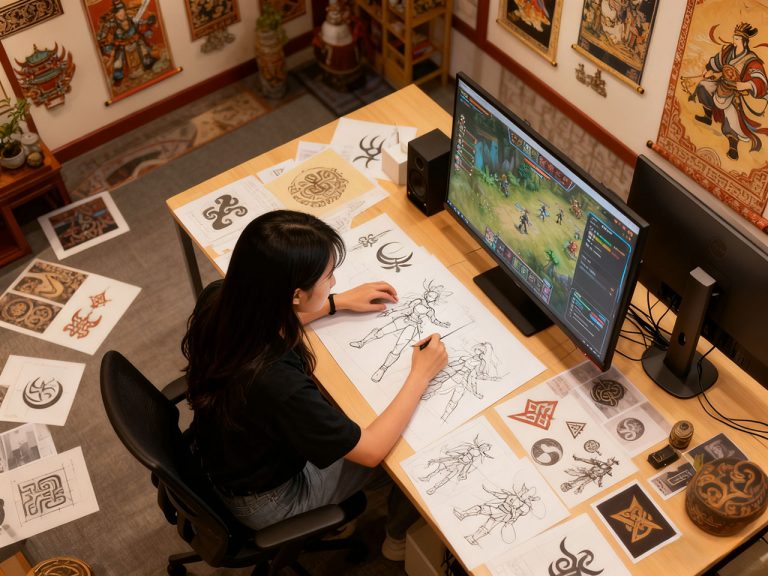
Decoding the Success of Indie Games: What Sets Them Apart in the Competitive Gaming Market
The world of gaming has evolved immensely over the years, and among the most intriguing developments has been the rise of indie games. While mainstream titles often dominate the spotlight, indie games have carved out a significant niche, captivating audiences with their unique offerings. This post explores the various elements that contribute to the success of indie games in the highly competitive gaming market.
The Rise of Indie Games
Indie games, short for independent games, are developed by individuals or small teams without the financial support of large publishers. This independence allows developers to explore innovative ideas and concepts that might be deemed too risky by major companies. Over the past decade, indie games have gained a substantial following, thanks in part to digital distribution platforms such as Steam and the Nintendo eShop.
These platforms provide indie developers the opportunity to reach global audiences without the traditional barriers of physical distribution. As a result, players have access to a diverse range of games that may otherwise never see the light of day. The democratization of game distribution has been a pivotal factor in the success of indie games.
Creativity and Innovation
One of the most distinguishing features of indie games is their creativity. Freed from the constraints of conventional publishing, indie developers often push the boundaries of what games can achieve. They experiment with new gameplay mechanics, art styles, and storytelling techniques. This creative freedom results in unique gaming experiences that often resonate deeply with players.

For example, the critically acclaimed game “Undertale” by Toby Fox challenged traditional RPG mechanics by allowing players to complete the game without killing enemies. This innovative approach to gameplay, combined with a compelling narrative and charming graphics, helped “Undertale” become a massive hit, both commercially and critically.
Personal and Emotional Storytelling
Indie games are renowned for their ability to deliver personal and emotional stories. Without the pressure of appealing to a mass market, indie developers can focus on crafting narratives that are meaningful and impactful. These stories often touch on themes of love, loss, identity, and existence, providing players with an experience that is both entertaining and thought-provoking.
Games like “Celeste” and “Life is Strange” are excellent examples of indie games that tackle serious topics with sensitivity and depth. “Celeste” explores themes of mental health and perseverance, while “Life is Strange” delves into issues of choice and consequence. These narratives resonate with players on a personal level, elevating the gaming experience beyond mere entertainment.
Community Engagement and Support
Another critical factor in the success of indie games is the strong community engagement and support they receive. Indie developers often maintain close relationships with their player base, actively seeking feedback and incorporating it into their games. This open dialogue fosters a sense of community and belonging among players, who feel invested in the game’s development and success.
Platforms like itch.io and Kickstarter have further strengthened the bond between developers and players. These platforms allow developers to showcase their projects and secure funding through crowdfunding campaigns, enabling players to become part of the game’s journey from conception to completion.
Challenges Faced by Indie Developers
Despite their success, indie developers face numerous challenges. Limited budgets and resources often mean that indie teams must wear multiple hats, handling everything from programming to marketing. This can lead to burnout and stress, especially when deadlines loom.

Furthermore, the sheer volume of indie games released each year can make it difficult for individual titles to stand out in a crowded market. Developers must find creative ways to market their games and capture the attention of potential players amid the noise of mainstream releases.
The Future of Indie Games
Looking ahead, the future of indie games appears bright. As technology continues to advance, indie developers will have access to even more tools and resources to bring their visions to life. The growing popularity of virtual reality (VR) and augmented reality (AR) presents new opportunities for indie creators to explore innovative gameplay experiences.
Moreover, the ongoing support from digital distribution platforms and the global gaming community suggests that indie games will continue to thrive. As players seek out fresh and unique experiences, indie games are well-positioned to deliver the creativity and innovation that mainstream titles sometimes lack.
Takeaways
In conclusion, the success of indie games in the competitive gaming market can be attributed to their creativity, emotional storytelling, and strong community engagement. These games offer players something different from the mainstream, often challenging conventions and exploring new ideas. While indie developers face obstacles, their determination and passion continue to drive the industry forward. As the world of gaming evolves, indie games will undoubtedly remain an essential and vibrant part of the landscape, captivating players with their originality and heart.
Impact on the Gaming Industry
The influence of indie games extends beyond their own success; they have also significantly impacted the broader gaming industry. By introducing fresh ideas and innovative gameplay mechanics, indie games have inspired larger developers to take creative risks, leading to a more diverse range of games across all platforms.

For instance, the success of indie titles like “Minecraft” and “Stardew Valley” has demonstrated that there is a substantial market for sandbox and simulation games. These titles have not only achieved commercial success but have also influenced the design and development of mainstream games, encouraging larger studios to incorporate similar elements into their projects.
Encouraging Diversity and Representation
Indie games have also played a crucial role in promoting diversity and representation within the gaming industry. With the ability to tell personal stories and explore underrepresented themes, indie developers have brought a wider variety of voices and perspectives to the forefront.
Games like “Gone Home” and “Night in the Woods” have been praised for their inclusive storytelling, exploring themes related to LGBTQ+ experiences and mental health. By highlighting diverse narratives, indie games have helped to foster a more inclusive gaming community, encouraging conversations about representation and the importance of diverse voices in game development.
Educational and Cultural Value
Indie games can also serve an educational purpose, offering players insights into different cultures, histories, and social issues. Developers often use their games as a platform to educate and raise awareness about important topics, providing players with a deeper understanding of the world around them.
For example, “Never Alone” is an indie game that draws on the rich cultural heritage of the Iñupiat people of Alaska. By collaborating with indigenous storytellers and artists, the developers created a game that not only entertains but also educates players about Iñupiat traditions and folklore, preserving cultural narratives for future generations.
Opportunities for Aspiring Developers
The rise of indie games has also opened up opportunities for aspiring developers, providing a viable pathway into the gaming industry. With the proliferation of accessible development tools and resources, such as Unity and Unreal Engine, individuals and small teams can create high-quality games without the need for extensive financial backing.
This accessibility has democratized game development, enabling new talent to emerge and contribute to the industry. Aspiring developers can showcase their skills and creativity, gaining recognition and experience that may lead to further opportunities within the gaming world.

Takeaways
Indie games have undoubtedly left an indelible mark on the gaming industry, offering players unique and engaging experiences that challenge the status quo. Through creativity, emotional depth, and community engagement, indie developers have not only achieved commercial success but have also influenced the direction of the gaming landscape.
As technology continues to evolve and the demand for diverse and innovative games grows, indie games will remain a crucial component of the gaming ecosystem. Their ability to push boundaries and explore uncharted territory ensures that they will continue to inspire and captivate players around the world, enriching the gaming experience for all.
The Role of Digital Platforms in Indie Gaming Success
Digital platforms have been instrumental in the success of indie games, providing developers with the tools and visibility needed to reach a global audience. These platforms not only offer a marketplace for distribution but also facilitate community interaction, feedback, and marketing opportunities.
For example, Epic Games Store has emerged as a significant player by offering developers a favorable revenue share model, allowing them to retain a larger percentage of their profits. This kind of support encourages indie developers to invest more in their projects, leading to higher quality games.
Monetization Strategies for Indie Games
Monetization is a critical aspect of sustaining indie game development. Indie developers often employ diverse strategies to generate revenue, including one-time purchases, in-game purchases, and subscription models. Additionally, many successful indie games have leveraged merchandise sales and crowdfunding campaigns to fund development and expand their reach.
Platforms such as Patreon allow developers to secure ongoing financial support from fans, providing a steady income stream that can be used for game updates and new projects. This approach not only supports the developers financially but also strengthens the relationship between creators and their audience.

The Importance of Marketing and Community Building
While creating a great game is essential, effective marketing and community building are crucial for an indie game’s success. Developers often engage with their audience through social media, forums, and live streaming platforms to build a loyal fan base and generate buzz around their games.
Social media platforms like Twitter and Reddit serve as valuable tools for indie developers to share development updates, gather feedback, and connect with potential players. By fostering a strong online presence, developers can create anticipation and excitement, leading to increased visibility and sales upon release.
Case Studies of Successful Indie Games
Several indie games have set benchmarks for success in the industry, serving as case studies for aspiring developers. “Hollow Knight,” developed by Team Cherry, is a prime example of an indie game that achieved critical and commercial acclaim. With its immersive world, challenging gameplay, and stunning art style, “Hollow Knight” captivated players and established a dedicated fan base.
Another notable success story is “Cuphead,” which gained widespread recognition for its distinctive hand-drawn animation and challenging boss battles. Developed by Studio MDHR, “Cuphead” showcased the potential of indie games to achieve mainstream popularity while retaining creative independence.
Conclusion: The Enduring Legacy of Indie Games
Indie games have proven to be a transformative force in the gaming industry, offering innovative, diverse, and meaningful experiences that resonate with players worldwide. Their success is a testament to the creativity and passion of independent developers who continue to push the boundaries of what games can achieve.
As the industry evolves, indie games will remain an essential part of the gaming ecosystem, inspiring new generations of developers and players alike. By embracing creativity, fostering community, and exploring uncharted territories, indie games have secured their place as a vital and dynamic component of the gaming landscape, ensuring that their legacy will endure for years to come.






